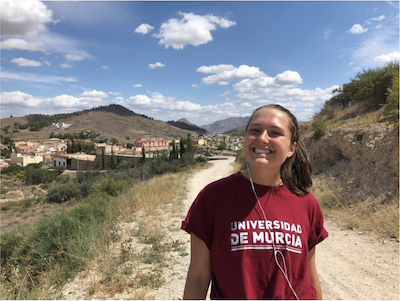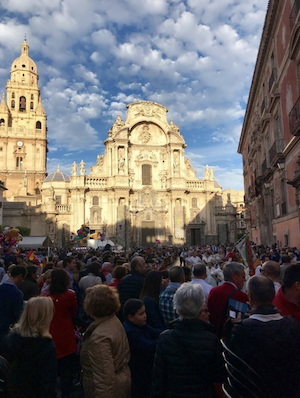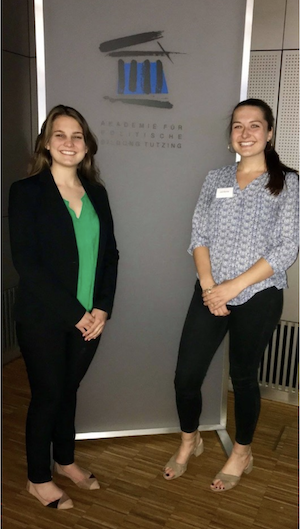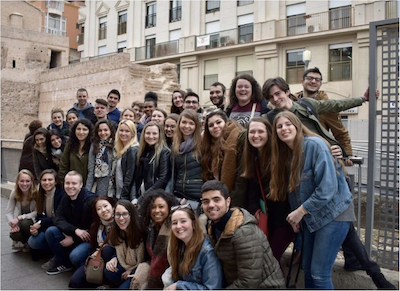Julia graduated in 2019 from Virginia Tech with degrees in International Public Policy, Spanish, and a minor in Arabic. During her junior year, she studied abroad at La Universidad de Murcia in Spain for six months. She now works at a nonprofit in Washington D.C. to empower those directly impacted by the United States’ broken immigration system through storytelling, as a means of driving policy change. She attributes living abroad to equipping her with some of the most vital skills she uses in her career today. Read about how she reflects on her time abroad in her own words:

Julia hiking in Murcia.
Why Murcia?
Ever since I began studying Spanish in elementary school, I dreamed of going abroad. Every Spanish teacher I've ever had described full language immersion at the magical last puzzle piece to language fluency. Therefore, choosing a location with as minimal English available as possible was one of my top priorities. I forced myself to be surrounded by Spanish for six months through choosing a region with few tourists and going through ISEP, on a program where I knew no one else from my home university. Another big factor for me was deciding between a Latin American country or Spain.
Entering college, I knew that I wanted to one day work in the U.S. immigration space, and because of that I had always planned on studying in a Latin American country. However, throughout undergrad I ended up taking many courses on Spanish culture and literature in my department at Virginia Tech, because I really admired the professors that taught those courses. During my freshman year, I was searching for extracurricular activities and my love for dance and random experiences led me to joining a flamenco dance group that I was a part of all four years of college. Naturally, this further peaked my interest in Spanish culture.
The last deciding factor in choosing to study in Spain was when I added a minor in Arabic around my sophomore year. My love for languages continued to grow. I was also interested to learn more about the Arab world as I noticed an apparent rise of islamophobia in the U.S. around this time. Arab culture still prevails throughout most regions in Spain and particularly in the South. This truly seemed like the perfect location to continue my studies, I even ended up taking a course in Moroccan dialect at the university in Murcia.
The beautiful cathedral, Murcia's status as a university town, its nickname as the "orchard of Europe", proximity to gorgeous beaches, and constant sunny weather were all factors that became the icing on top of the cake.

La Catedral de Murcia during Easter celebrations.
How to Utilize Your Network
While in Spain, I reached out to an organization that I had interned with the previous summer. I received information about an international conference in Munich, Germany that the organization was taking part in and I let them know that I was in Spain, and asked if I would be able to attend. Without even directly asking, they offered to sponsor my trip to Munich from Murcia. The conference dates coincided with my university’s spring break and I decided to present a budget plan to see if I could extend my return trip back from Munich.
I drafted up a budget for multiple overnight buses and trains that would allow me to stop in different countries on my way back to Spain and compared it to the cost of a flight from Munich to Spain. It actually cost less than a one way ticket back to Spain and the organization had no problem reimbursing me for this amount. I was able to stop in Austria, Hungary, and Barcelona on my way back from Germany with transportation paid for and without missing any classes.
I made so many unexpected professional and personal connections on this trip. My attendance at the conference ended up being an incredible opportunity to network with professors from my university and our international partners. I learned about service programs that researchers all around the world were implementing for refugees and other displaced populations. During my trip back through Austria and Hungary traveling alone, I either stayed in hostels or connected with friends of friends or family for housing. Many of them volunteered as local guides for their hometowns in Budapest and Krakow. I challenge all students going abroad to remember that your network runs deep; utilize this as much as possible, seek connections wherever you go, never be afraid to ask someone for a place to stay (you will be shocked how many people welcome you with open arms and take joy in sharing their home with you).
When I returned to my home university the following semester, I had several professors come to me as a resource for why Virginia Tech should fund research on refugees and create more courses on these topics. Today, the conference is an experience I frequently reference in professional interviews and definitely stands out on my resume.

Epic Growth from Epic Embarrassment
Living abroad is an incredible addition to any resume or LinkedIn profile in any professional field. You gain a unique sense of independence, confidence, can advance language skills, learn a new language, adapt cultural humility and survive in an entirely new school system, along with countless other critical soft skills. However, what really impacted my personal and professional life forever and served as the greatest sources of pride for me were the challenges I overcame, discovering a new international network of friends and colleagues, and realizing my deep desire to live abroad again in my future.
No class could ever compare to my experience taking an intermediate Moroccan dialect course in Spanish. For the rest of my academic career, I truly remembered that if I passed that class I could pass any class. At Virginia Tech, I had taken Arabic classes in an entirely different dialect, I really had absolutely no idea what was going on in that classroom for several weeks. I could physically feel my brain sweating as it worked on a third language being taught in a second language. I also took a class with a professor that was not very tolerant of international students and did not understand why we took her class. I had to have difficult conversations with both of those professors about my final grades and nothing taught me more about university culture in Spain than making it through those two classes - making it through, also known as, barely passing Arabic and actually failing the other class. I had never failed a class before in my entire life, and as they say, “the most important thing in life is learning how to fall.” I had this new level of confidence after overcoming those fears of failing and embarrassment.
Other challenges included interactions with locals where my Spanish failed me. At the beginning of my time abroad, and on random bad days throughout, I would have a hard time registering for classes, negotiating bills with landlords, completing necessary forms, understanding lectures and speaking with impatient store clerks that thought I was stupid. When this would happen, I truly wanted to curl into a ball under a blanket where English was the only language that existed. However, I had no choice but to learn how to stop someone and confess when I didn’t understand something (no nodding my head yes and pretending). Doing this to shake off someone thinking that I was not intelligent, and developing unique ways to communicate my needs, very quickly helped me learn to communicate better in Spanish.
While many of these experiences were mortifying, humiliating, and anxiety inducing - I have forever become better equipped to handle these kinds of situations in my career, and life in general, as life is full of these moments. These moments are my favorite stories to tell friends, as I have so much pride in accomplishing what seemed impossible. I gained a new level of empathy for what so many immigrant populations that I work with can go through in the U.S.
I always knew that I was passionate about traveling and experiencing cultures different from my own. However, before living in Spain, I had never lived in a country besides the U.S. for more than two weeks. Being in Spain was a test for myself and solidified those dreams of living abroad in the future. Even when I returned from Spain, I was able to more deeply connect with international students in the U.S. and further understand their experiences. I connected with networks, like the ISEP alumni network, to continue my involvement and passion for international education as a tool to create more globally conscious and compassionate humans in this world.

Erasmus students together during orientation.